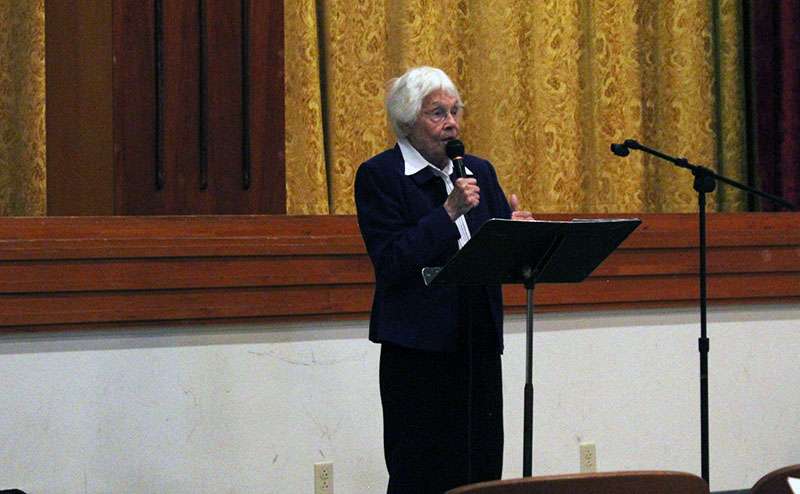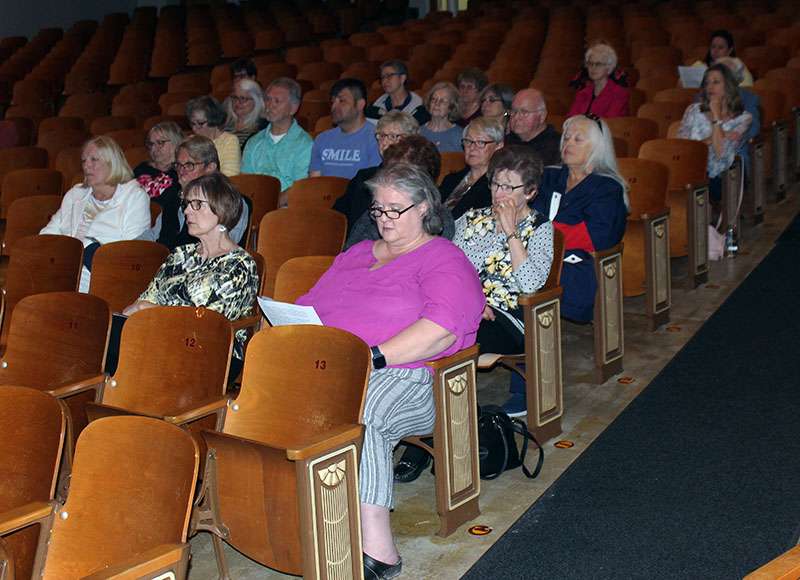Speaker: Sex trafficking not just an over there problem – Hays Post

By CRISTINA JANNEY
Hays Post
Although human trafficking is illegal in every country in the world, it is the fastest-growing criminal industry, worth more than $152 billion a year.
Margaret Nacke, a Sister of St. Joseph of Concordia, spoke about human trafficking Wednesday night to a group in Victoria.
Nacke founded U S. Catholic Sisters Against Human Trafficking 10 years ago. The faith-based national network offers education, supports access to survivor services and engages in advocacy to end modern-day slavery.
Nacke said Americans like to think of slavery as a problem that happens over there in other countries, but human trafficking is happening in the United States and even in our small, rural communities.
“They are real slaves by definition,” she said. “People forced to work without pay and unable to escape. They are trafficked in brothels, factories, rest stops, hotels and they are women and children.
“Despite real progress, slavery often remains hidden.”
In American history, slaves were advertised on posters in taverns. Today traffickers use the internet and social media to sell people.
An estimated 100,000 children are commercially sexually exploited annually in the U.S. That number could be as high as 300,000.
Children as young as 8 and 9 are being forced into pornography and the sex trade.
In the United States, 82 percent of the human trafficking is sex trafficking. Ninety-eight percent of those who are trafficked are women and girls, although Nacke said there's been a steady increase in the number of men and boys who are being sex trafficked.
Trafficked victims can be anyone. They can come from “good homes” and wealthy families, she said.

A judge from Colorado told her the story of how his father, who was a doctor, abused him from the time he was a boy and then sold him to others for sex.
Grooming is a significant factor in luring girls and boys into the sex trade. Social media is often used to do that. Runaways, foster children, children who have been abused, individuals who suffer from drug addiction, LGBTQ youth and individuals in poverty are more vulnerable, she said.
Interstates, including I-70 and I-80, are shipping lanes for traffickers.
The group Wednesday talked about the need for parents, grandparents, teachers, doctors, emergency room personnel, hairdressers and even dentists to be aware of how to spot signs of trafficking.
Warning signs
Via Christi Health offered some of those red flags in handouts provided at the lecture.
- Has few or no personal possessions.
- Suddenly has expensive items with no means to pay for them
- Has a much older girlfriend or boyfriend
- Carrying large amounts of cash
- Calls significant other daddy
- School-age but not in school
- Shows signs of physical or sexual abuse
- Has tattoos that say “daddy” or “property of …”
- Sexually transmitted diseases
- Malnutrition
- Lack of health care
- Clothing inconsistent with the weather
- Is accompanied by a controlling person
- Exhibits fear and nervousness and avoids eye contact
- Does not control passport, ID or other personal documents
- Hyper-vigilance
- Is not in control of their own money
Once a person is in the sex trade, life can be brutal and short. Nacke said her organization is helping a woman whose pimp pulled out all her top teeth as a punishment for trying to run away.
Mail-order brides or forced marriages are other forms of slavery. Nacke said her organization was contacted about a citizen from another country bringing a child bride onto a U.S. university campus. The organization wasn't able to help the girl because the man had legally married her in his home country.
Nacke said minors who have been forced into the sex trade are not criminals, although they were traditionally treated as such by the U.S. justice system.
The pimps and the customers are the criminals, she said.
“Just like with any product, if you don't have buyers, the product closes out. That is not happening as far as buying people,” she said.
Nacke said she hopes more families will talk about this issue with the men in boys. She also said she would like to see more research on why men, typically 40 to 60, married with children and college educated, chose to buy women and girls for sex.
Labor trafficking is even more common than sex trafficking, and it is occurring in the United States. Minor immigrants desperate to earn money to help support their parents come to America and are put to work in dangerous jobs.
Every day, Americans use products and consume foods that are produced by child laborers in other countries. These products can include coffee, chocolate, rice, fish, fresh produce, gold jewelry and athletic shoes.
Nacke encouraged people to research where and by whom the products they buy are made. They also can choose fair-trade products.
How to get help
If you suspect abuse or trafficking, call 911. If you are a victim of sex trafficking or are seeking help for someone who is, you can access help through Options Domestic and Sexual Violence Services in northwest Kansas.
You can reach an advocate through Options through its text, chat or phone hotlines. Text the word “Hope” to 847411.
The 24-hour phone helpline is 1-800-794-4624. The chat and other information can be accessed on the Options website at help4abuse.org. All of the helplines and chats are manned 24/7, 365 days a year. All services are free and confidential.
The agency also has a mobile unit that travels throughout its 18-county catchment area. Contact Options through one of the means above to learn more.
Other resources:
FBI: 1-800-225-5324
National Missing and Exploited Child Unit: 1-800-843-5678
National Human Trafficking Hotline: 1-888-373-7888, Text: “BeFree” (233733)
NoTrafficking.org
National Domestic Violence Hotline: 1-800-799-7233
This “Eyes on Trafficking” story is reprinted from its original online location.
Fair Use Notice: The PBJ Learning Knowledge Vault is dedicated to advancing understanding of various social justice issues, including human trafficking and related topics. Some of the material presented on this website may contain copyrighted material, the use of which has not always been specifically authorized by the copyright owner. We are making such material available in our efforts to promote education and awareness of these important issues. There is no other central database we are aware of, so we put this together for both historical and research purposes. Articles are categorized and tagged for ease of use. We believe that this constitutes a ‘fair use' of any such copyrighted material as provided for in section 107 of the US Copyright Law. In accordance with Title 17 U.S.C. Section 107, the material on this site is distributed without profit to those who have expressed a prior interest in receiving the included information for research and educational purposes. For more information on fair use, please visit: “17 U.S. Code § 107 – Limitations on exclusive rights” on Cornell Law School's Legal Information Institute.
 ABOUT PBJ LEARNING
ABOUT PBJ LEARNING
PBJ Learning is a leading provider of online human trafficking training, focusing on awareness and prevention education. Their interactive Human Trafficking Essentials online course is used worldwide to educate professionals and individuals how to recognize human trafficking and how to respond to potential victims. Learn on any web browser (even your mobile phone) at any time.
More stories like this can be found in your PBJ Learning Knowledge Vault.
EYES ON TRAFFICKING
This “Eyes on Trafficking” story is reprinted from its original online location.
ABOUT PBJ LEARNING
PBJ Learning is a leading provider of online human trafficking training, focusing on awareness and prevention education. Their interactive Human Trafficking Essentials online course is used worldwide to educate professionals and individuals how to recognize human trafficking and how to respond to potential victims. Learn on any web browser (even your mobile phone) at any time.
More stories like this can be found in your PBJ Learning Knowledge Vault.
